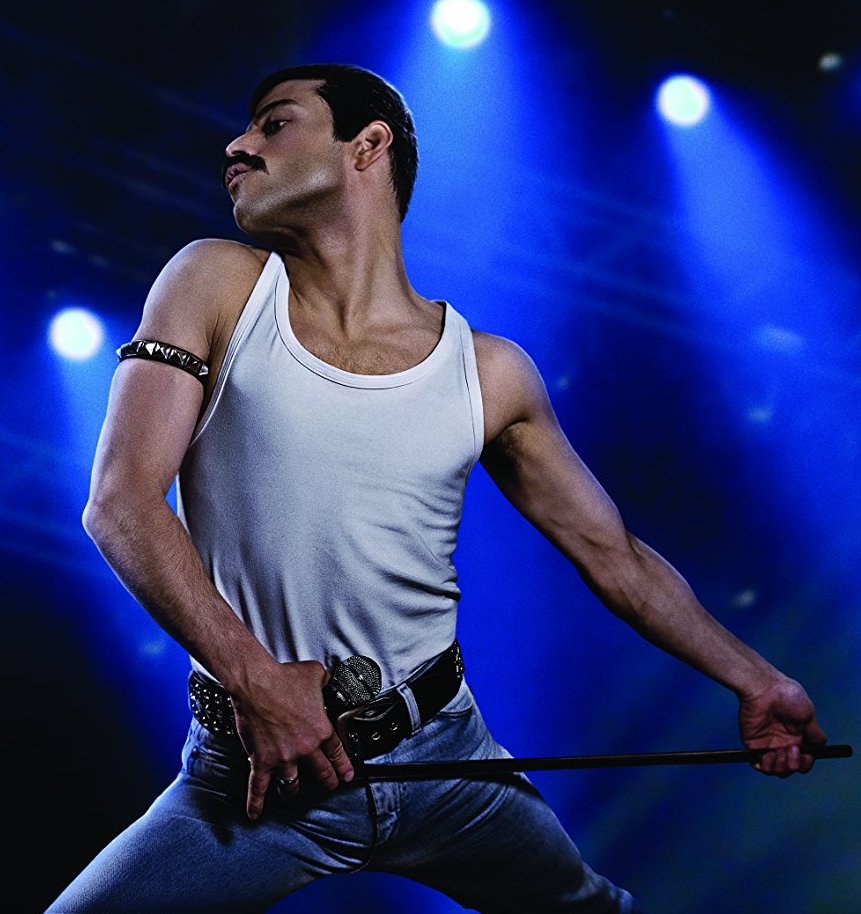 Bohemian Rhapsody (Bryan Singer, 2018)
Bohemian Rhapsody (Bryan Singer, 2018)
 Bohemian Rhapsody (Bryan Singer, 2018)
Bohemian Rhapsody (Bryan Singer, 2018)
Rami Malek, Lucy Boynton
The story of the legendary rock band Queen and lead singer Freddie Mercury, leading up to their famous performance at Live Aid (1985).
I spent most of the time watching this worrying about Rami Malek's top front teeth. They seem to be real, but nevertheless still worry him, as his mouth is continually having to adjust to accommodate them. He may have been a thumbsucker, and has a serious overbite. I actually thought, for two hours, that he had a prosthetic denture.
The fact that I was looking at the actor means that I wasn't distracted by his performance. I did not believe for a second that I was looking at the actual Farrokh Bulsara — though it did occur to me several times to wish that I was watching a recording of a concert performance by Queen, rather than some guys pretending to be them.
The story doesn't help. It obeys the usual two rules of Hollywood: the protagonist has to be 1. in jeopardy, and 2. in love with ... a girl! But a rock god is usually, by definition, someone to be worshipped rather than worried about. And Freddie Mercury must have been one of the most famous gay men ever. So what's this crap about some chick being 'the love of his life'??
[There's an inevitable comparison to be made with Bradley Cooper's A Star is Born. It's also about a rock star - but his career really is in jeopardy. And his interest in the girl does seem to be heterosexual.]
I might have been more interested in this film if it had taken some interest in Mercury's actual lovelife than this normative fantasy, and also shown more of the process of recording, rather than alternatively boring with backstage band relationships and dazzling with its own version of a rock concert performance.
Bohemian Rhapsody is bad in the way a lot of biopics are bad: it's superficial, it avoids complexity, and the narrative has a connect-the-dots quality. This kind of badness, while annoying, is relatively benign. However, the attitude towards Mercury's sexual expression is the opposite of benign. The tensions of being a gay man in the 1970s are not handled, or even addressed. He himself seems unaware of his own sexual desires. He falls in love with Mary Austin ... and looks shocked and disturbed when a trucker gives him a seductive side-eye at a restroom in middle America. (Fade to black. We never see what happened next.) Later, Mary says to him, 'You're gay, Freddie,' and he responds, 'I think I'm bisexual.' That's as far as the conversation goes. The film is rated PG-13, so there's not much sex in it anyway, but he's shown in a romantic context only with Mary.
There's no other word for this approach than phobic. Sheila O'Malley.It is very strange that a film like Bohemian Rhapsody would be nominated for Best Picture. Don’t get me wrong, it is an enjoyable film, and features rousing renditions of some of Queen’s most popular anthems. Yet director Bryan Singer (The Usual Suspects, X-Men) offers nothing of any note here. Rami Malek, who is good in the TV series Mr. Robot, seems out of his depth, and his efforts to transform into singer Freddie Mercury are ever visible. This is the kind of film one might watch on a plane and find mildly inspirational – it offers the rare spectacle of artists succeeding, a fantasy seldom realised in real life – only to forget it all by the time you are collecting your luggage. On a more negative note, it is at times moralistic in its vision of sexuality and desire, depicting Mercury’s time in the Berlin queer scene as decadent and destructive. Mercury is redeemed when he enters a monogamous relationship and reunites with his heterosexual band mates, all in time for Live Aid. Ari Mattes, The Conversation.
Wikipedia page
IMDb page
Oscars 2019
Garry Gillard | reviews | New: 18 January, 2019 | Now: 10 March, 2019